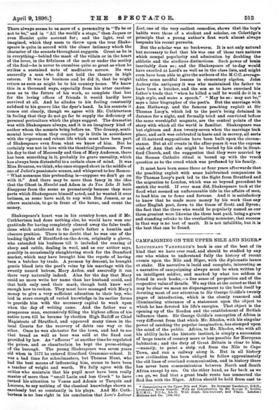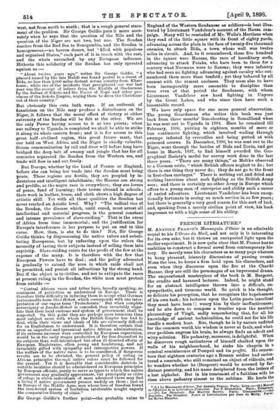CAMPAIGNING ON THE UPPER NILE AND NIGER."
LIEUTENANT VANDELBUR'S book is one of the best of its kind that we have ever read, and should be studied by any one who wishes to understand fully the history of recent events upon the Nile and Niger, with the diplomatic issues at stake. His narrative is lucid and complete, interesting as a narrative of campaigning always must be when written by an intelligent soldier, and marked by what too seldom is found in such books,—a fine sense of proportion and of the respective value of details. We say this at the outset so that it may be clear we mean no disparagement to the book itself by devoting most of our attention to Sir George Goldie's twenty pages of introduction, which is the closely reasoned and illuminating utterance of a statesman upon the object to which he has devoted his life's energies. That object is the opening up of the Soudan and the establishment of British influence there. Sir George Goldie's conception of Africa is very different from that which Mr. Rhodes, with his singular power of catching the popular imagination, has stamped upon the mind of the public. Africa, to Mr. Rhodes, who with all his ability lacks the historic instinct, is simply a succession of large tracts of country more or less possible for European habitation; and the duty of Great Britain is clear to him, —namely, to paint a strip red from the Nile to Cape Town, and run a railway along it. But in all history new civilisation has been obliged to follow approximately the old lines of overland communication, and in history there has never been communication between North and South Africa except by sea. On the other hand, as far back as we CALI go, we find that a great trade route has connected the Red Sea with the Niger. Africa should be held from east to • Campaignirg on the Upper Nile and Niger. By Seymour Vaudeleur, D.S.G. Li,utenant, Scots Guarde. With au Introduction by Sir G. orge T. Goldie. K.C.M.G., D.C.L. LLD. With 1.1aps. Illthtratiow. and Plane. London: Methuen and Co. DM. 6d.]
west, not from north to south ; that is a rough general state- ment of the problem. Sir George Goldie puts it more accu- rately when he says that the question of the Nile and the question of the Niger are not two, but one. The Soudan reaches from the Red Sea to Senegambia, and the Soudan is homogeneous,—no barren desert, but "filled with populous
and organised States," each part of it in touch with the rest, and the whole unreached by any European influence.
Hitherto this solidarity of the Soudan has only operated against us :—
"About twelve years ago," writes Sir George Goldie, "a placard issued by the late Mahdi was found posted in a street of Bida, no less than 2,000 miles distant across country from Khar- toum; while one of the incidents that precipitated our war last year was the receipt of letters from the Khalifa at Omdurman by the Sultan of Sokoto and the Emirs of Nup6 and other pro- vinces of the Sokoto Empire, urging them to drive the Christians out of their country."
But obviously this cuts both ways. If an outbreak of fanaticism on the Nile may produce a disturbance on the Niger, it follows that the moral effect of victory at either
extremity of the Soudan will be felt at the other. We are the only Power having access to it at two points ; when our railway to Uganda is completed we shall be able to strike it along its whole eastern front ; and it is for access to this great half- civilised region, this great future mart, that our hold on West Africa and the Niger is chiefly valuable. Steam communication by rail and river will before long have bridged the deep belt of swamp' and jungle that has for all
centuries separated the Soudan from the Western sea, and trade will flow in and out freely.
But Europe, whether by the hand of France or England, before she can bring her trade into the Soudan must bring peace. These regions are fertile, they are peopled by in- dustrious and intelligent inhabitants; the Hansas are strong and prolific, as the negro race is everywhere; they are lovers of peace, fond of learning; their towns abound in schools ; their work in leather, brass, and cloth shows a high degree of artistic skill. Yet with all these qualities the Soudan has never reached an Asiatic level. Why P "The radical vice of the Soudan, the disease which, until cured, must arrest all intellectual and material progress, is the general constant and intense prevalence of slave-raiding." That is the curse
of Africa from time immemorial; and the justification for Europe's interference is her purpose to put an end to this curse. How, then, is she to do this ? Not, Sir George Goldie thinks, by dispossessing the native rulers and substi- tuting Europeans, but by enforcing upon the rulers the
necessity of taxing their subjects instead of selling them into captivity. Slave-raiding exists for the profit of the few at the expense of the many. It is therefore with the few that
European Powers have to deal ; and the policy advocated is gradually to extend the area in which raids shall not
be permitted, and punish all infractions by the strong hand. But if the object is to civilise, and not to extirpate the races at present ruling in the Soudan, the white man must protect from outside :— " Central African races and tribes have, broadly speaking, no sentiment of patriotism as understood in Europe. There is therefore little difficulty in inducing them to accept what German jurisconsults term Ober-Hoheit, which corresponds with one inter- pretation of our vague term Protectorate.' But when complete sovereignty or Landes-Hoheit is conceded, they invariably stipu- late that their local customs and system of government shall be respected. On this point they are perhaps more tenacious than most subject races with whom the British Empire has had to deal, while their views and ideals of life are extremely difficult for an Englishman to understand. It is therefore certain that even an imperfect and tyrannical native African administration, if its extreme excesses were controlled by European supervision, would be in the early stages productive of far less discomfort to its subjects than well-intentioned but often ill-directed efforts of European Magistrates, often young and headstrong, and not invariably gifted with sympathy and introspective powers. If the welfare of the native races is to be considered, if dangerous revolts are to be obviated, the general policy of ruling on African principles through native rulers must be followed for the present. Yet it is desirable that considerable districts in suitable localities should be administered on European principles by European officials, partly to serve as types to which the native government may gradually approximate, but principally as cities of refuge in which individuals of more advanced views may find a living if native government presses unduly on them ; just as in Europe of the Middle Ages, men whose love of freedom found the iron-bound system of feudalism intolerable sought eagerly the comparative liberty of cities."
Sir George Goldie's further point—the probable value to
England of the Western Soudanese as soldiers—is beat illus- trated by Lieutenant Vandelenr's account of the Hausa cam- paign. Many will be reminded of Mr. Wells's Martians when they read of the little square with its front of eighty yards, advancing across the plain in the face of twenty-five thousand enemies, to attack Bida, a town whose wall was twelve miles in circuit. And, be it remembered, these five hundred in the square were Hausas, the race of hereditary serfs, advancing to attack Fulahs, who have been to them for a century what Normans were to Saxons; they were infantry who had seen no fighting advancing against cavalry who out- numbered them more than tenfold ; yet they behaved by all consent with the utmost coolness. They seem also to have been incomparably more amenable to discipline than were even at that period the Soudanese, with whom Lieutenant Vandeleur saw hard fighting in ITnyoro by the Great Lakes, and who since then have such a lamentable record.
We have only space for one more general observation. The young Guardsman who writes this book was just back from three months' lion-shooting in Somaliland when he was sent out to Uganda in 1894. Here he remained till February, 1896, putting in eighteen months of more or less continuous fighting, which involved wading through swamps infested by crocodiles and being potted at with poisoned arrows. In December, 1896, he was sent out to the Niger, went through the battles of Bida and Ilorin, and got home in March, 1897, to find himself awarded the Geo- graphical Society's medal for survey work done in the last three years. "There are many things," as Moltke observed to a German critic, "which British officers neglect to do ; but there is one thing they never do; they do not go to the front in first-class carriages." There is nothing cut and dried and nothing luxurious about such fighting as the British Army sees; and there is certainly no other Army in Europe which offers to a young man of enterprise and ability such a career of varied adventure. Lieutenant Vandeleur has been excep- tionally fortunate in seeing so much service in so few years ; but there is generally a very good reason for this sort of luck, and, speaking from a merely civilian point of view, his book impresses us with a high sense of his ability.



































 Previous page
Previous page